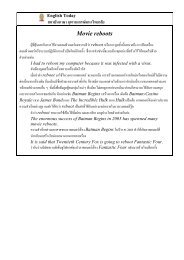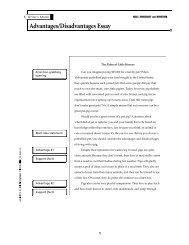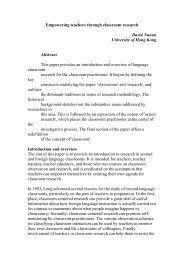Using Interviews as Research Instruments - CULI
Using Interviews as Research Instruments - CULI
Using Interviews as Research Instruments - CULI
You also want an ePaper? Increase the reach of your titles
YUMPU automatically turns print PDFs into web optimized ePapers that Google loves.
<strong>as</strong> examines some of the ethical issues involved in conducting an<br />
interview.<br />
<strong>Interviews</strong><br />
<strong>Interviews</strong> are a systematic way of talking and listening to people<br />
(http://www.who.int) and are another way to collect data from individuals<br />
through conversations. The researcher or the interviewer often uses open<br />
questions. Data is collected from the interviewee. The researcher needs<br />
to remember the interviewer’s views about the topic is not of importance.<br />
The interviewee or respondent is the primary data for the study.<br />
Interviewing is a way to collect data <strong>as</strong> well <strong>as</strong> to gain knowledge from<br />
individuals. Kvale (1996, p. 14) regarded interviews <strong>as</strong> “ … an interchange<br />
of views between two or more people on a topic of mutual interest, sees<br />
the centrality of human interaction for knowledge production, and<br />
emph<strong>as</strong>izes the social situatedness of research data.”<br />
<strong>Interviews</strong> are ways for participants to get involved and talk about their<br />
views. In addition, the interviewees are able to discuss their perception<br />
and interpretation in regards to a given situation. It is their expression<br />
from their point of view. Cohen, Manion and Morrison (2000, p. 267)<br />
explain “ … the interview is not simply concerned with collecting data<br />
about life: it is part of life itself, its human embeddedness is inescapable.”<br />
The researcher h<strong>as</strong> to know and select the appropriate method for<br />
addressing the needs of the research question. Then, the researcher h<strong>as</strong> to<br />
make a decision and choose the right method for that study. Data<br />
collection h<strong>as</strong> its complexities and demands. This article <strong>as</strong>sumes that the<br />
right data collection method is interviewing, which “ … h<strong>as</strong> its own issues<br />
and complexities, and demands its own type of rigour” (O’Leary, 2004, p.<br />
162).<br />
It is the role of the researcher to <strong>as</strong>k questions. The questions ought to<br />
elicit valid response from respondents. Hoyle, Harris and Judd (2002, p.<br />
144) comment that questions have “ … dual goals of motivating the<br />
respondent to give full and precise replies while avoiding bi<strong>as</strong>es<br />
stemming from social desirability, conformity, or other constructs of<br />
disinterest.”<br />
Interviewers that have been properly trained, and play the proper role of<br />
the interviewers along with well-designed questions can conduct a good





